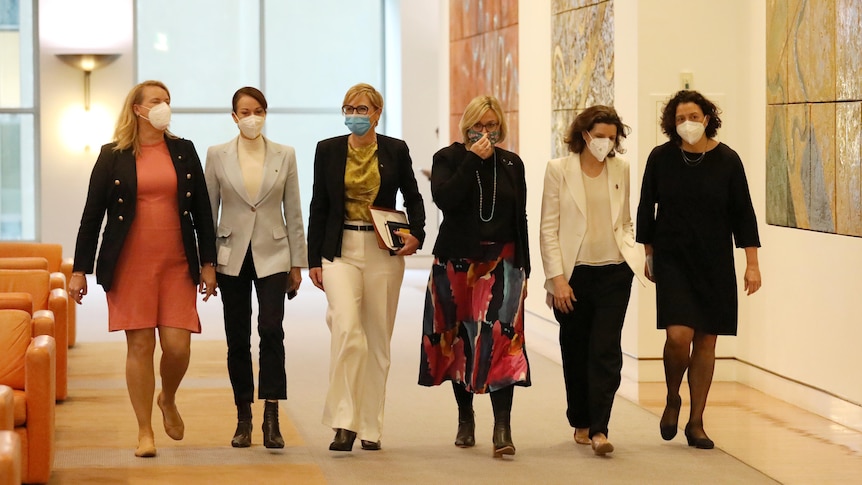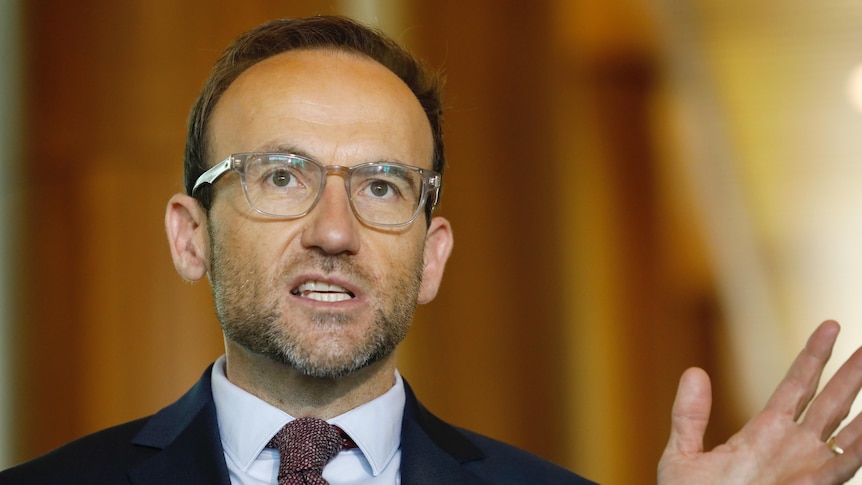A bill to write the government’s 43 per cent emissions reduction target into law has passed the lower house after the government agreed to several minor amendments from the crossbench.
Key points:
- The government has agreed to a number of tweaks to its climate target bill
- The bill, which writes a 43 per cent emissions reduction target into law, passed the lower house
- Senior Liberal Simon Birmingham says he supports a 43 per cent target
The federal government did not need the votes of crossbenchers in the lower house to pass its climate target bill, but it agreed to support amendments moved by a number of independents.
The “teal” independent MPs who swept into parliament on a platform of climate action and government integrity have celebrated the federal government’s willingness to negotiate changes to its bill.
Independent MP Zali Steggall, who topped former prime minister Tony Abbott in 2019, said negotiations on the first major piece of legislation to be brought to parliament had been much more collaborative than with the previous government.
“I can only say the evidence so far is that there is a genuine desire from senior ministers in the government to work with us, they have heard the calls from our communities,” Ms Steggall said.
“We are getting numerous briefings on significant pieces of legislation, we are contributing, we are raising our concerns and amendments are being agreed to.”
The government voted to amend its bill to spell out that its approach to emissions reduction would draw on the “best available scientific knowledge”, that its 43 per cent target was a minimum standard, and that climate change policies benefit regional communities.
It will now also have to seek advice from the Climate Change Authority before setting future climate targets.
Before voting to pass the bill, Climate Change Minister Chris Bowen took a moment to thank the crossbench for their contributions, saying “today is a good day for our country.”
Crossbench lends support, but aims for higher target
The teal MPs were disappointed by a target they see as insufficient for limiting global warming to below 2 degrees Celsius, and said they would continue to push the government for more ambitious action.
The government rejected a separate Greens amendment to lift its target to reduce emissions by 75 per cent by 2030 and reach net zero by 2035.
Greens leader Adam Bandt said the government’s target would lead to the death of the Great Barrier Reef, failed crops and worsening natural disasters.
“That is the science. That is why we are doing this,” Mr Bandt said.
“We’re not doing this to try [to] stop pollution a little bit. We are doing this to try [to] stop climate change becoming a runaway chain reaction.”
Ms Steggall said the next step for the government must be to phase out oil, coal and gas by ending new approvals, a key sticking point of the Greens, who agreed yesterday to give the bill the votes needed to pass the senate despite not receiving that concession.
Independent MP Kylea Tink said the government must also continue the collaborative precedent it has set.
“The planning starts from now, so whether it’s a fight or whether it’s the capacity to actually work together to move our country forward is what this parliament needs to decide,” Ms Tink said.
“We won’t just accept the minister’s word and we won’t just take it on good faith these things are going to happen.”
Prime Minister Anthony Albanese said the government’s core policies on climate change were not up for negotiation, but the government would continue to work constructively where reasonable suggestions were made.
He said the climate target bill would not hasten the closure of coal and gas facilities.
Senior Liberal backs 43 per cent emissions target
The Opposition formally decided to oppose the climate target bill earlier this week, though some Liberals have broken with the party in support of an increased target, including Tasmanian MP Bridget Archer who crossed the floor to support the bill.
Shadow Foreign Minister Simon Birmingham said this morning he also supported the higher target, though he stopped short of backing the bill.
“If the 43 per cent target required legislation then I would have wanted to vote for it in a heartbeat. However, it doesn’t require legislation,” Senator Birmingham told ABC Radio.
“[Opposition Leader] Peter Dutton has been clear following the deliberations the Coalition’s had this week that we will be taking a greater level of ambition to the next election.
“The test will now be in terms of that policy, making sure that it is a genuine policy for higher levels of emission reduction.”
New MP Monique Ryan, who won Kooyong from former treasurer Josh Frydenberg at the election, said Liberals were leaving their electorates out of the conversation by refusing to engage.
“My predecessor in Kooyong never crossed the floor in his 12 years in parliament,” Dr Ryan said.
“I think that the people of Kooyong today will be very happy that they have a representative who has worked with the government to make this bill stronger, rather than refusing to engage with it and in doing so losing their own voice.
“By taking themselves out of the discussion the Liberals have disenfranchised the people they represent.”
.

